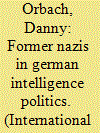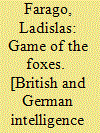| Srl | Item |
| 1 |
ID:
191084


|
|
|
|
|
| Summary/Abstract |
The early history of the postwar West German foreign intelligence service is replete with accounts of former Nazi security officers who were recruited by the newly founded service thanks to their professional experience, connections, and anti-Soviet credentials, only to later be exposed as Soviet moles. Focusing on the case of Heinz Felfe, this article puts forward the argument that the reaction of a secret service to the impending exposure of moles can be even more harmful than their actual activity. Enemy moles in intelligence organizations are dangerous in more than one way. They cause damage, of course, when they operate in the dark, but also cause just as much, and even more, damage when exposed. The fear of public scandal incentivizes irrational behavior, aggravating rather than decreasing the dangers facing the service.
|
|
|
|
|
|
|
|
|
|
|
|
|
|
|
|
| 2 |
ID:
032395


|
|
|
|
|
| Publication |
London, Hodder and Stoughton, 1971.
|
| Description |
xxi, 696pHbk
|
| Standard Number |
0-340-15879-4
|
|
|
|
|
|
|
|
|
|
|
|
Copies: C:1/I:0,R:0,Q:0
Circulation
| Accession# | Call# | Current Location | Status | Policy | Location |
| 009479 | 940.5485/FAR 009479 | Main | On Shelf | General | |
|
|
|
|
| 3 |
ID:
132432


|
|
|
|
|
| Publication |
2014.
|
| Summary/Abstract |
Much of today's intelligence literature emphasizes the role of cognitive bias and organizational pathologies in the explanation of intelligence failure. Adversary deception complicates the problem, not only for intelligence analysts and managers but for intelligence theorists as well. Operation Bodyguard, the deception plan covering Allied landings in Normandy in northwestern France in June 1944, is a case in point. Although German intelligence and decisionmaking displayed flaws, Bodyguard was such a monumental and masterful counterintelligence and deception operation that even perfectly rational individuals and organizations might have struggled to divine the truth through its fog and misdirection. Much of its deceptive power derived from the exploitation of human psychological traits that have come to be understood scientifically only in recent decades.
Although a famous historical event (associated with one of World War II's most famous quotations), Bodyguard warrants re-examination in light of modern psychology and intelligence theory. This battle between intelligence and deception is valuable as a case study in the general theory of deception and its underlying cognitive factors, understanding and mastery of which are vital to success in information-age conflict.
|
|
|
|
|
|
|
|
|
|
|
|
|
|
|
|